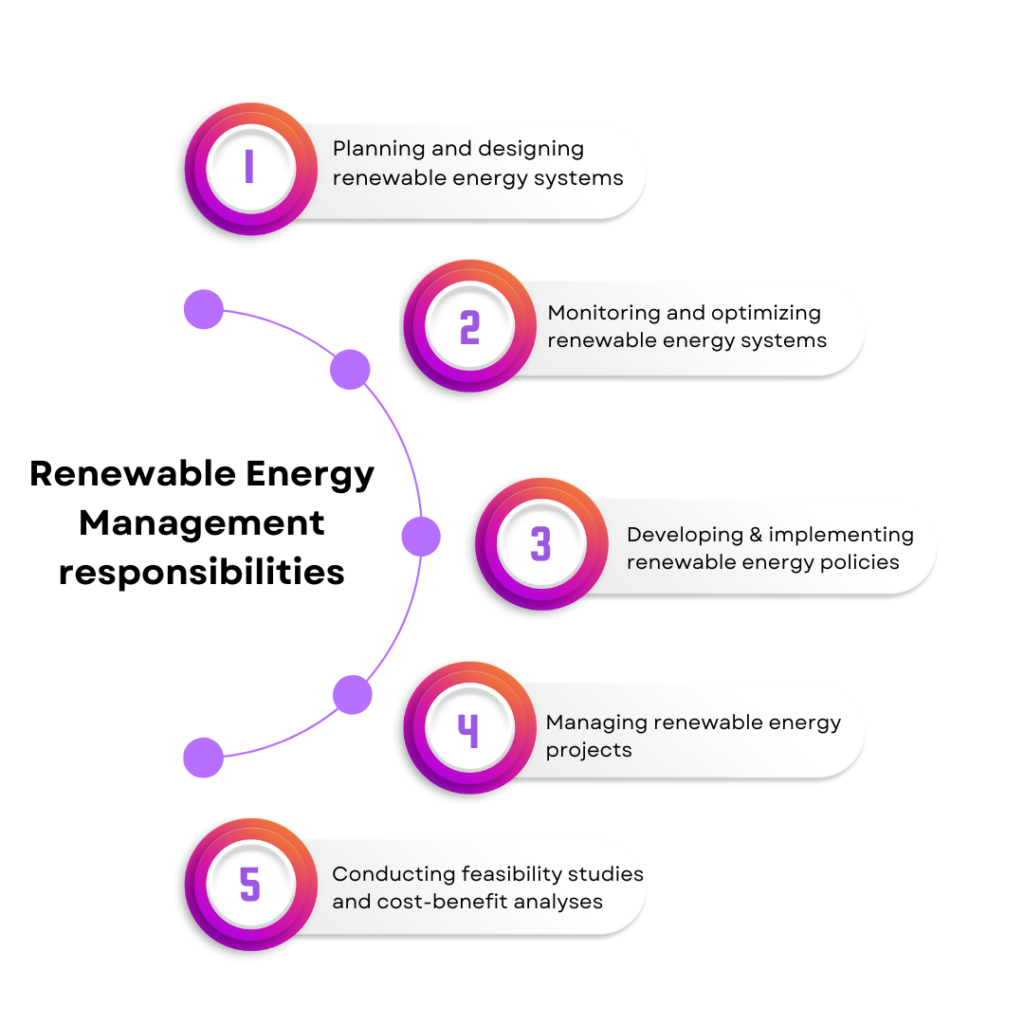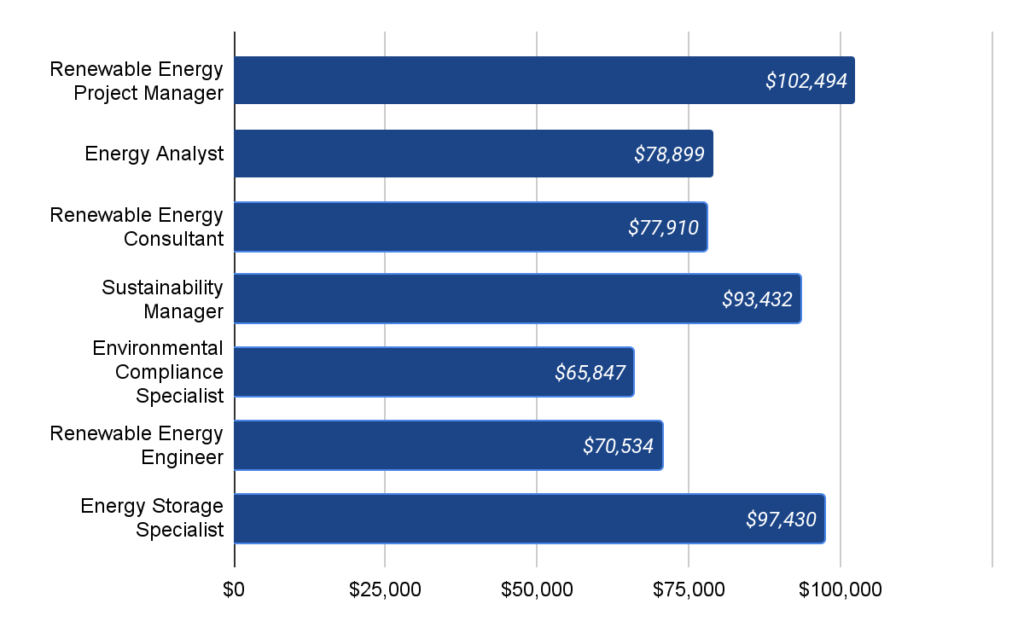The demand for renewable energy management professionals is on the rise as the world adapts to the “new normal” of recognizing the impact of climate change. This shift in perspective has resulted in a growing demand for professionals with specialized skills in the field of renewable energy management. According to the Bureau of Labor Statistics, the job outlook for environmental scientists and specialists, which includes renewable energy management, is expected to grow by 5% from 2021 to 2031, which is as fast as the average for all occupations.
In addition to job security, renewable energy management professionals can expect to earn competitive salaries. According to the Bureau of Labor Statistics, the median annual wage for environmental scientists and specialists was $76,530 in May 2021.
What is Renewable Energy Management?
Renewable energy management refers to the coordination of various tasks involved in planning, developing, and implementing renewable energy projects and systems. It includes assessing the feasibility of renewable energy projects, designing and building renewable energy systems, managing and maintaining renewable energy infrastructure, and optimizing energy production from renewable sources.

Degrees Required For Renewable Energy Management Careers
Renewable energy management careers typically require a bachelor’s or master’s degree in a related field. Some common majors for this career path include
- Renewable Energy Engineering,
- Environmental Science/Studies
- Sustainability Studies
- Energy Management
- Business Administration (with a focus on sustainability or renewable energy).
Here are 13 Online and Accredited degree programs in Renewable Energy
Online Bachelor’s Degrees In Renewable Energy
#1. Bismarck State College
Program: Energy Management (BAS)
Tuition: $329.37 per credit hour (resident); $ 384.27 per credit hour (international)
Accreditation: Higher Learning Commission
Financial Aid: Available, with 83% of students receiving financial aid.
BSC provides the BAS in Energy Management program to address the energy industry’s needs for skilled supervisors and managers and offer career advancement opportunities for energy workers. This program was created in response to the nation’s rising demand for energy and the need for highly trained professionals in the energy field.
#2. National American University
Program: B.S in Energy Management
Tuition: $380.00 per credit hour
Accreditation: Higher Learning Commission
Financial Aid: Available, with 100% of students receiving financial aid.
The online Bachelor of Science in Energy Management degree blends management and business principles with the energy industry, allowing students to gain job-relevant knowledge and skills in sustainability, energy accounting, and renewable energy. This transfer-friendly program is unique in that it combines technical education and leadership training, producing graduates who are prepared to take on leadership roles in the Energy Management industry rather than just technical positions.
#3. Franklin University
Program: B.S Energy Management
Tuition: $398 per credit hour
Accreditation: New England Commission of Higher Education
Financial Aid: Available, with 95% of students receiving financial aid.
By enrolling in Franklin University’s Energy Management degree program, you will gain the necessary knowledge and skills to effectively utilize conventional business principles such as accounting, economics, finance, management, and marketing within the energy sector. This degree will prepare you for leadership and managerial positions in the industry.
#4. University of Wisconsin System
Program: BS in Sustainable Management
Tuition: $450 per credit hour
Accreditation: Higher Learning Commission
Financial Aid: Available, with 58% of students receiving financial aid
The Online BS in Sustainable Management delves into scientific and ecological concepts to enhance problem-solving abilities. The program further explores sustainability-focused subjects such as environmental science and policy, agricultural systems, triple-bottom-line accounting, ecology and biodiversity, renewable energy, natural resource management, corporate social responsibility, and climate change.
#5. Unity College
Program: B.S. in Sustainable Business Management: Renewable Energy
Tuition: $470 per credit hour
Accreditation: New England Commission of Higher Education.
Financial Aid: Available, with 97% of students receiving financial aid.
The B.S. in Sustainable Business Management: Renewable Energy program at Unity College is designed to equip students with the knowledge and skills required to become innovative leaders in the growing green energy sector. The program offers practical training and professional development opportunities to individuals interested in pursuing a career that promotes the use of renewable energy.
#6. Excelsior University
Program: BPS in Technology Management (Concentration in Renewable Energy Technology)
Tuition: $510 per credit hour
Accreditation: Middle States Commission on Higher Education
Financial Aid: Available, with 3,141 students receiving financial aid (as of 2021 data).
Concentration in Renewable Energy Technology focuses on developing a strong understanding of commercial and residential renewable energy technologies and the political and economic factors that affect the industry. The coursework covers various renewable energy technologies’ technical, business, and cultural aspects, including solar, wind, water, and geothermal energy. The program aims to provide students with the foundational knowledge to succeed in the field.
#7. The University Of The Southwest
Program: BBA with Emphasis in Energy Management
Tuition: $599 per credit hour
Accreditation: Higher Learning Commission
Financial Aid: Available, with 95% of students receiving financial aid.
The BBA program with a specialization in energy management prepares students for the energy sector, covering business concepts, as well as tax, law, and renewable energy. The University of the Southwest is a private institution in New Mexico that offers online accredited degrees, allowing students to balance their studies with other commitments while developing faith, responsibility, and initiative.
#8. Everglades University
Program: B.S Degree with a major in Alternative and Renewable Energy Management
Tuition: $800 per credit hour
Accreditation: SACSCOC
Financial Aid: Available, with 75% of students receiving financial aid.
The Alternative and Renewable Energy Management program is designed to equip students with the necessary knowledge and skills to pursue a Bachelor of Science Degree and enter into entry-level careers in the field. The degree program focuses on management skills and business knowledge that are essential in adapting to the constantly evolving energy industry, especially in construction management. Students will have the opportunity to learn about alternative and renewable energy sources, sustainability principles, energy conservation, and the latest trends and technologies used in the industry.
Online Master’s Degrees In Renewable Energy
#1. Oklahoma City University
Program: M.S. Energy Management | Part-time
Tuition: $590 per credit hour
Accreditation: (Programmatic) American Association of Professional Landmen (AAPL) and AACSB
Financial Aid: Available, with 98% of students receiving financial aid.
The online M.S. Energy Management program is meant to train and prepare the leaders of the energy industry of the future by focusing on the business side of the field. The program emphasizes practical concepts that can be applied in real-world situations, both in the students’ current careers and in the capstone project. The faculty, consisting of seasoned professionals with extensive experience in the industry, teach the curriculum using an applied approach, providing students with a wealth of knowledge and a unique perspective.
#2. University Of Connecticut
Program: M.S Energy and Environmental Management
Tuition: $825 per credit hour
Accreditation: New England Commission of Higher Education
Financial Aid: Available, with 77% of students receiving financial aid.
The Master of Energy and Environmental Management (MEEM) is an advanced online postgraduate degree program instructed by the distinguished faculty at UConn. The curriculum adopts a comprehensive approach that merges essential knowledge and practical skills to equip you with the ability to positively impact society by implementing immediate real-life solutions.
#3. New York Institute of Technology
Program: Energy Management, M.S.
Tuition: $1,470 per credit hour
Accreditation: Middle States Commission on Higher Education
Financial Aid: Available, with 99% of students receiving financial aid.
The Energy Management, M.S. program provides an opportunity to acquire expertise in the most recent technologies utilized in sustainable buildings, power systems, and security for facilities. The program covers wind energy, advanced batteries, and smart grid systems, revolutionizing electricity generation and delivery. Additionally, students will have access to advanced research opportunities in the Energy and Green Technologies Lab.
#4. The University of Texas at Dallas
Program: M.S in Energy Management
Tuition: $1,866 per credit hour (resident); $2,765 per credit hour (non-resident)
Accreditation: SACSCOC
Financial Aid: Available, with 95% of students receiving financial aid.
The Energy Management master’s program at The University of Texas at Dallas’ Naveen Jindal School of Management aims to equip students with the necessary skills to become leaders in the energy industry. The program is designed by renowned faculty and located in close proximity to numerous energy-related companies in Texas. Students will learn how to evaluate energy companies and projects, develop operational strategies, negotiate contracts, and manage energy-specific risks.
#5. Johns Hopkins University
Program: Sustainable Energy, M.S
Tuition: $12,014 per semester
Accreditation: New England Commission of Higher Education
Financial Aid: Available, with 65% of students receiving financial aid.
The MA in Sustainable Energy (Online) program offered by the Johns Hopkins University School of Advanced International Studies (SAIS) is specifically crafted for working professionals who are enthusiastic about contributing to the evolution of renewable energy. Backed by a progressive curriculum and renowned faculty members, the program at Johns Hopkins SAIS delivers exceptional practical experience and comprehensive understanding, making it a distinguished choice compared to other similar programs.
What Can You Do With A Degree In Renewable Energy Management?
Renewable energy management degrees prepare students for various roles in the renewable energy sector, including project management, energy analysis, and policy advocacy. Graduates of these programs are equipped with the skills and knowledge needed to identify opportunities for renewable energy adoption, develop and manage renewable energy projects, and analyze energy data to support decision-making processes. Some common career paths for individuals with a degree in renewable energy management include the following.

Are Jobs In Renewable Energy Management In Demand?
As the world continues to shift towards renewable energy sources, there is a growing need for professionals with the skills and knowledge to manage renewable energy projects, develop renewable energy policies, and advocate for renewable energy adoption. According to the Bureau of Labor Statistics, employment in the renewable energy sector is projected to grow faster than the average for all occupations. This growth is expected to be driven by increased demand for renewable energy and the need to replace aging infrastructure.
Salary Potential For Careers In Renewable Energy Management
The salary for careers in renewable energy management can vary depending on the specific role, location, and experience level. According to data from the Bureau of Labor Statistics, the median annual wage for environmental scientists and specialists, which includes renewable energy managers, was $76,530 in May 2021. However, individuals with more experience and advanced degrees can earn significantly higher salaries.
Is A Career In Renewable Energy Management Worth It?
A career in renewable energy management can be a rewarding and fulfilling choice for individuals who are passionate about sustainability and the environment. Not only does the field offer the opportunity to make a positive impact on the planet, but it also provides ample job opportunities and competitive salaries. With the growing demand for renewable energy, a career in renewable energy management is a smart choice for individuals who want to contribute to a more sustainable future while building a successful career.
Conclusion
As the world becomes more aware of the environment, getting a degree in managing renewable energy is a good idea. This field offers countless career opportunities that can make a significant impact. With the ever-increasing demand for sustainable energy, professionals in this field should expect to earn competitive salaries and job security. Also, a career in managing renewable energy gives you the chance to help make the future more sustainable, and the pay is good. If you are passionate about creating a positive impact and contributing to a better world, pursuing a degree in renewable energy management could be the perfect choice for you.

